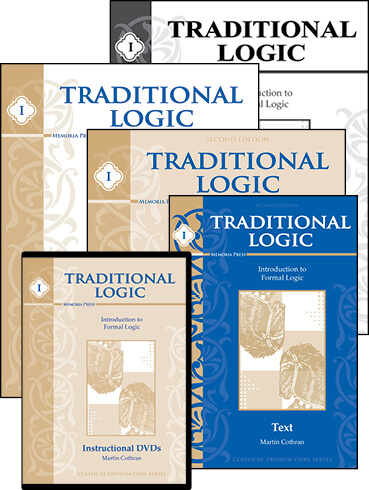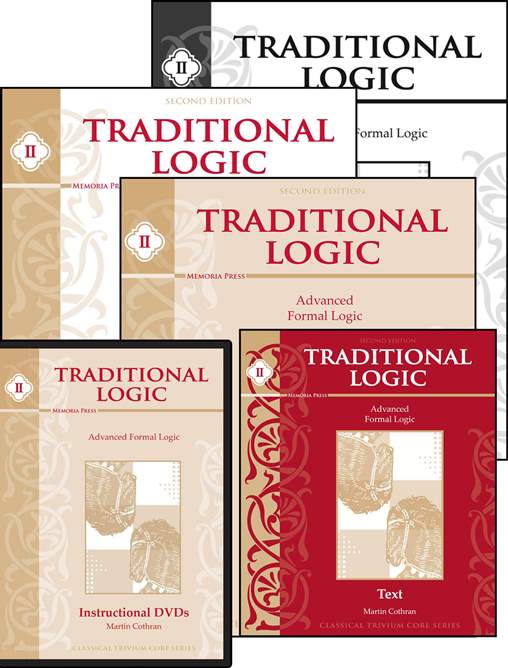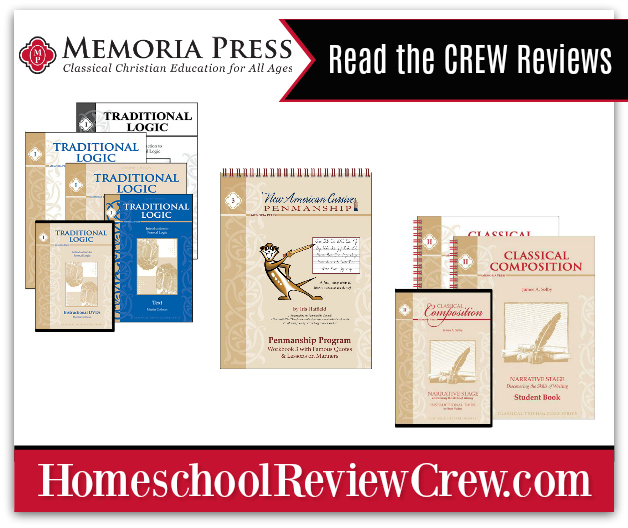In April I learned there would be another Memoria Press review with the Homeschool Review Crew.



My box arrived and I opened it up. The content of Logic I and Logic II contains a lot of different parts! Each set includes: Student Text, Instructional DVDs, Student Workbook, Teacher Key, and Quizzes and Final Exam book.
When you first get your new materials, it is such a joy! There is that new-book smell. There is that giddy feeling of, "Where do I start?" ...It is like being a kid in a candy factory ...wondering what to taste first! The website lets you see samples from these books (click through the links):
Student Text, Student Workbook, Teacher Key, and Quizzes and Final Exam book.
A
high school student can complete Logic I in their first semester and
Logic 2 in their second semester to get a full year of credit in
"Logic". I started my study of logic following that plan and focusing
on Logic I, Traditional Logic: Introduction to Formal Logic.
I wasn't initially sure where to start, so I started by reading the Introduction in the Text for Introduction to Formal Logic. There is "A Note to the Teacher" before the "Introduction: What is Logic?"
After reading through the Introduction once, I watched the DVD section for the Introduction. I concluded that in the future I would watch the week's DVD lesson before reading the appropriate section in the Student Text.
Next I opened the Student Workbook. The steps in the Student Workbook are very clear. The assignment for "Exercises for Day 1" start by asking you to (re)read a certain section of the chapter before answering the questions for the day.
I learned that Memoria Press Logic was originally used with a co-op class room setting, where the students met together once each week to review past material and learn new material. Then each week the students had daily assignments to complete before the next classroom setting. Some weeks the Workbook had six sections to fill out. This doesn't mean the student has to do weekend homework -- they can certainly do two sections on any given day.
Each week also concludes with a quiz or a test. There is a lot of flexibility in how to implement the various parts of the program. For me, personally, the quiz fits best either doubled up with the workbook on the last day of workbook assignments or doubled up on the Video-watching day before watching the next day's video. Since I prefer to do quizzes while the material is fresh in the mind, I like to do the quizzes on Fridays. I like to do the videos on Mondays.
I have noticed that the method Memoria Press uses - poco en poco (little by little) - is the best method for learning new concepts. And the method of filling in the workbook, day by day, with repetitive review of the chapter content is very effective to cement retention! Falling into a rhythm of a chapter each week, the material content is very manageable.
Book 1 focuses on Traditional Logic: Introduction to Formal Logic. It explains in the Introduction that there are two types of logic: traditional logic and modern logic. Traditional logic is the study of the classical syllogism; modern logic involves the study of calculus and propositions. A syllogism is an "argument" with two premises from which you draw a conclusion. Traditional logic involves stating premises, making judgments, and drawing conclusions. There are different things to identify, such as if a premise is true or not (such as "George Washington was a man," vs. "George Washington was a poodle"). One also needs to determine if the conclusion drawn is logical or not based on the premises given. There are so many terms and definitions to learn and identify -- I could go on a long time! This course also covers formal logic, not informal logic. Informal logic involves the discussion of fallacies. That discussion has a place, but it is not covered in this course.
Here is a peek at the Table of Contents:
I look forward to working in Traditional Logic II later this year, where I will study Advanced Formal Logic.
Glancing at the Table of Contents, Book 2 seems to cover content from Book 1 but at a deeper level. Here is a look at the Table of Contents to Advanced Formal Logic:

Memoria Press has never disappointed me -- I have never used a Memoria Press product that I did not love! I am so delighted with Memoria Press Traditional Logic. I will always remember the line from The Lion, The Witch and The Wardrobe, where the Professor is bemoaning that the schools no longer teach the children logic. Because of this I always wanted to study logic myself and teach it to my children. I am pleased that I now am working on learning logic.
I remember days when my family was in co-op with the Scott Somerville family, and Scott would explain to the kids, "If A = B and B = C, the A = C!" And I remembered that much from Geometry studies. On the contrary, if A = B but B does not equal C, then A does not equal C. All these are parts of logic. Oh, this all intertwines with debate as well! Because to win a debate you just have to win that the argument is is valid from its premises! You don't have to prove that the premises are true! I mean, some are obvious, like it is true Socrates was a man. In complex debates, though, the premises might not be obviously true or false, but if you can prove that the conclusion flows logically from the premises you can win the debate (even with false premises!). I love this stuff! It can be so fun!
I have always loved the way Memoria Press encourages moms to not just educate their students but also to educate themselves. It is much easier to teach a subject you know yourself. It is difficult to learn the subject while teaching it to your students. It can also be embarrassing, because the young mind learns the material so much faster than our older brains! If you do not think your own kids are ready for Formal Logic yet, you might consider studying it yourself this year (like I am) so that you can teach it to your children next year!
Other members of The Old Schoolhouse Homeschool Review Crew also reviewed Traditional Logic, or one of many composition or cursive courses Memoria Press offers. To read more reviews of Memoria Press products, please click the link below:















